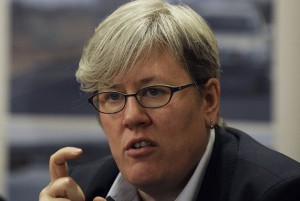PH a leader in climate conversation—WB exec
MANILA, Philippines – The Philippines is at the forefront of talks on climate change, a World Bank official said Friday at the 23rd World Economic Forum (WEF) on East Asia.
“Philippines is a leader…everybody here is focused on climate as a central government challenge,” said Rachel Kyte, vice president and special envoy on climate change of the World Bank (WB) and one of the speakers during the WEF’s “Climate Smart Growth” session held at Makati Shangri-La.
Kyte said climate change discussions have mostly been focusing on pollution control.
“What we are desperate to do is to bring the climate conversation out of the ministry of environment,” she said, explaining that this was what the Philippines has done by involving other agencies, including the Department of Finance, in tackling the issue of climate change.
The Philippines, which was hosting the WEF on East Asia for the first time in history, was the perennial example during the Friday morning plenary, especially with the devastation of Super Typhoon “Yolanda” (international name: Haiyan) last year still fresh in the minds of the global community.
Article continues after this advertisement“Current cities and future cities of this region, which are often at the coast, often constrained like Manila…will be highly vulnerable,” Kyte said.
Article continues after this advertisementThe WB envoy said cities like Manila will further face challenges as effects of climate change intensify. As cities continue to get congested, she said, “We will be putting more and more poor people in harm’s way.”
She explained that governments and other stakeholders should work hard to both mitigate and adapt to the effects of climate change.
“The extreme weather events [are] going to put extraordinary pressure on a declining land base,” Kyte said.
Painting a grim picture of the decades to come, she said a warmer global temperature will result in more vulnerability, poor air quality, and constrained economic growth.
Kyte said it is fortunate that innovations can address some of the problems, with the help of aggressive actions and policy change.
Putting a price on carbon, natural resources
Kyte and her fellow speakers also emphasized the need of a shift in perspectives, including the way people look at carbon, as well as natural resources.
“We have to tackle carbon…If carbon is considered as a global bad we need to put a price on it,” she said.
The WB official said by pricing carbon and pulling out subsidies from industries and goods that are deemed not consistent with sustainable development, cities and other vulnerable areas will positively benefit.
Asian Development Bank (ADB) President Takehiko Nakao agreed, adding that adapting to climate change will have to involve numerous policy changes.
“Regulation is the most powerful way to persuade the people,” he explained.
Nakao said governments should look into taxes, pricing of carbon and cutting subsidies for energy.
World Wildlife Fund (WWF) President Yolanda Kakabadse said it is also important to put value on natural resources such as forests and rivers since they “all are natural capital.”
“Those ecosystems have a value. [It should be] part of the national accounting system, she said.
Kakabadse pointed out that when the tsunami hit Japan and when Haiyan devastated the Philippines, the communities that were least affected were the ones near the forests or where there were mangroves.
RELATED STORIES
Environmentalist group says PH needs to improve climate change policy
